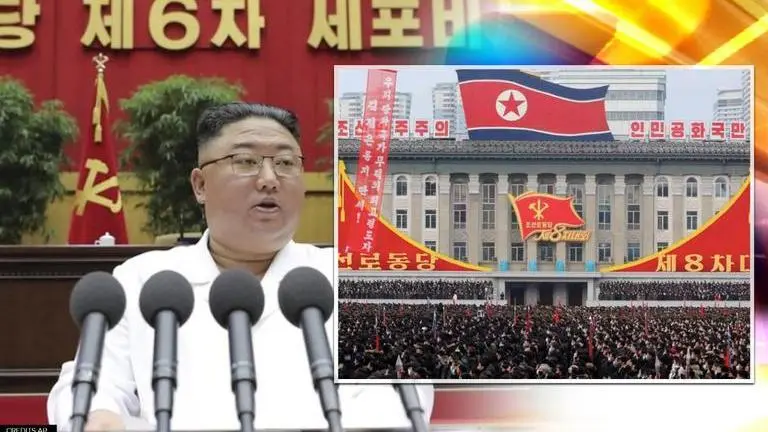Updated 11 April 2021 at 15:50 IST
Kim Jong-Un wages 'arduous march' amid food shortage in N. Korea 'worse than 1990s famine'
At WPK meeting, Kim Jong-Un said that North Korea was facing "worst-ever situation” due to widespread food shortage as trade with China plummeted.
- World News
- 3 min read

North Korea Human Rights Watch report, earlier last month, had claimed that there was "barely any food" going into North Korea from China for months, and many citizens at the border areas had succumbed to hunger. The missionary, on condition of anonymity, had also disclosed that North Korea’s prohibition of "free market" trade has led to a famine amid the COVID-19 pandemic worse than one that hit in the 1990s when the Soviet Union collapsed, and food supplies had hampered due to post-war North Korea's Stalinist economic system.
Now, admitting to the deepening economic crisis in his communist nation, North Korea’s leader Kim Jong-Un Saturday rang emergency alarms, declaring food shortage at a closing ceremony of the party conference. Jong-Un called for his countrymen to prepare for an "arduous march," a euphemism that North Koreans use to describe the disastrous famine in the 1990s that killed close to 3 million citizens.
At a meeting of the Workers' Party of Korea, WPK, North Korea’s leader said that the Korean country was facing the "worst-ever situation” due to widespread food shortage with citizens starving, as trade with friendly neighbour China plummeted due to coronavirus pandemic. Jong-Un referred to US-led sanctions and heavy flooding as also the cause for the economic difficulties. “There are many obstacles and difficulties ahead of us, and so our struggle for carrying out the decisions of the Eighth Party Congress would not be all plain sailing,” Kim told lower-level ruling party members, the state-run Korean Central News Agency (KCNA) reported, according to The Associated Press.
“I made up my mind to ask the WPK (Workers’ Party of Korea) organizations at all levels, including its Central Committee and the cell secretaries of the entire party, to wage another more difficult ‘arduous march’ in order to relieve our people of the difficulty, even a little,” Kim said.
The North Korean leader declared the countrywide famine in presence of his grassroots secretaries, saying that the crisis response would heavily rely on party cells as trade with China dipped by 90 percent after North Korea shut its border in an effort to contain the coronavirus pandemic that collapsed the country’s healthcare system. Even as deputy spokesman at South Korea’s Unification Ministry, Cha Deok-Cheol, told reporters that North Korea was establishing measures to ease border trade with China, a UN report claimed that the restrictions flared the "widespread food insecurity” in Pyongyang amid the 5-month restrictions.
Advertisement
UN special rapporteur says 'families sleep hungry'
At a separate news conference in Geneva, spokeswoman for the UN World Food Program (WFP) Elisabeth Byrs appealed to the UN Security Council to "reconsider sanctions” on Pyongyang's more than 40 percent of its population faced malnutrition. UN’s special rapporteur Tomas Ojea Quintana voiced similar concerns about the country's humanitarian crisis, saying that the pandemic had resulted in "drastic economic hardship” in North Korea, worsening food shortages to alarming levels. He added that there was an increased loss of income and jobs, and families ate only twice a day or ate only corn, while many slept hungry, without food. Despite sharing a porous border with the People’s Republic of China, North Korea had earlier made claims that there were zero cases of the novel coronavirus within its territory.
(Image Credit: AP)
Published By : Zaini Majeed
Published On: 11 April 2021 at 15:50 IST
